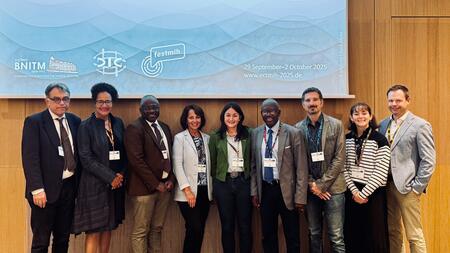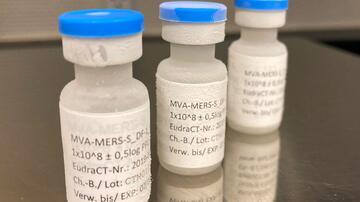„Better health for all in a changing world“
Cooperation partners DZIF and ANRS MIE together at European congress
They reported on the progress made in the global fight against the Mpox virus: Prof. Yazdan Yazdanpanah, ANRS MIE, Prof. Marylyn Addo, DZIF, Prof. Ayola Akim Adegnika, DZIF, Prof. Maura Dandri, DZIF, Prof. Asisa Volz, DZIF, PhD Emmanuel Nakouné, Institut Pasteur de Bangui, Prof. Jade Ghosn, Université Paris Cité, Dr. Jeanne Postal, Institut Pasteur, Dr. Timo Jäger, DZIF.
The German Center for Infection Research (DZIF) and the French National Agency for Research on HIV, Viral Hepatitis and Emerging Infectious Diseases (ANRS MIE) were represented at this year's European Congress for Tropical Medicine and International Health (ECTMIH) with a joint symposium. Under the overarching theme “Better health for all in a changing world,” the ECTMIH will return to Hamburg from September 29 to October 2, 2025, 30 years after its founding.
The ECTMIH serves as a platform for more than 1,500 international experts to exchange knowledge, network internationally, and discuss current challenges and solutions in global health.
At the symposium organized by the French-German partnership between ANRS MIE and DZIF, both cooperation partners presented the latest advances in vaccines, diagnostics, and therapies for the global fight against the Mpox virus.
Mpox is a recurrent viral disease that can be transmitted from animals to humans and vice versa. It occurs primarily in Central and West Africa. In May 2022, there was a global outbreak of Mpox in several countries, which was attributed to human-to-human transmission. More recently, an increasing number of human infections with the Mpox virus have been documented in the Democratic Republic of Congo. The increase in cases and rapid spread prompted the WHO to declare this outbreak a public health emergency of international concern. A characteristic feature of the Mpox outbreaks since 2022 is the sustained and efficient transmission from person to person. The reasons for the increased transmissibility and disease burden in the current Mpox outbreak are unknown. Molecular epidemiological and clinical data suggest that the virus has changed and is better adapted to the human host.
The joint session of the French-German partnership between ANRS MIE and DZIF addressed the origin of the disease, the body's defense mechanisms against the Mpox virus, and its adaptability. The clinical manifestation of one of the main types of Mpox (clade I) and its epidemiology, vaccine prevention, and treatment options were also presented.




